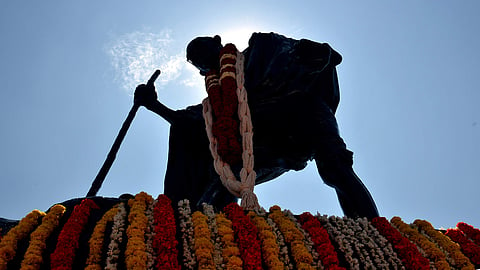

Mahatma Gandhi is 'set to return to life' on his birth anniversary this year. On October 2, the International Day of Non-Violence and the Mahatma's birthday, he will be 'brought to life' through a three-dimensional hologram at the fourth Ahimsa lecture in Paris. The life-size 3D hologram will "address the audience" to explain the Mahatma's philosophy in a life-like audio-visual medium.
The 3D hologram will feature in the Ahimsa Lecture delivered by leading proponents of peace and non-violence for the benefit of peacebuilders, policymakers, UNESCO Member States, youth and the international community. The event is being organised by UNESCO Mahatma Gandhi Institute of Education for Peace and Sustainable Development (MGIEP).
On the 150th year of his birth anniversary, the hologram of Gandhi will participate in a panel discussion on his philosophy of education for humans flourishing in a mixed reality set-up, in conversation with scientists, educationists, and policymakers. The hologram will "address the audience" for 15 minutes and will also be a part of a question-answer session during the event.
Professor of Developmental Psychology and Cognitive Neuroscience of Education and CNRS Gregoire Borst, Member of Advisory board of UNESCO MGIEP's TECH 2019 Vera El Khoury Lacoeuilhe and Director UNESCO MGIEP Anantha Duraiappah will be part of the panel discussion.
"While Gandhi was amongst the most photographed people of his time and the world has access to his photographs, filmed interviews and radio addresses, it is less than 5 per cent of the compiled 98 volumes of Mahatma Gandhi's written work. A hologram can bridge this gap and the written word of the Mahatma can be experienced in a life-like scenario," Dr Anantha Duraiappah said while speaking about the occasion.
Through Holography, a standing hologram will set the tone for the panel discussion on Gandhi's writings on satyagraha, ahimsa, kindness, critical inquiry and education. Gandhi's hologram will then sit with the panellists, to take part in the discussion, during which he will answer questions with 2 to 3-minute interventions.
UNESCO MGIEP is a category 1 research in education institute integral to UNESCO. It is supported largely by the MHRD and is the only UNESCO category 1 institute in the Asia Pacific Region with a mandate to mainstream social-emotional learning in education systems using innovative pedagogies.
